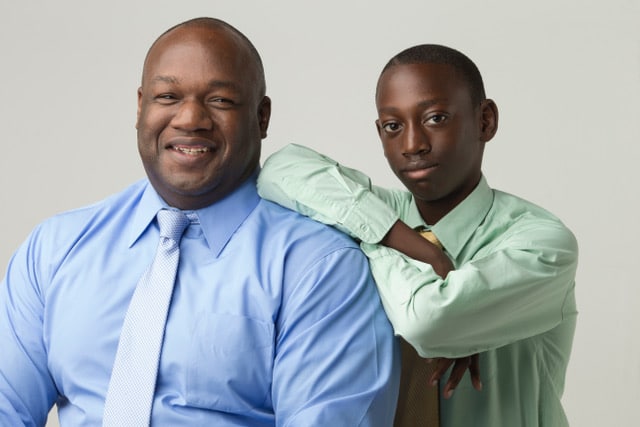A large, strong man, Ed said it brings tears to his eyes to think about “how my life used to be in comparison to now.” Two decades ago he was homeless. He struggled with drugs and alcohol, lost his job at the telephone company and was sleeping on friends’ couches and park benches. He had precious little hope and barely any faith in himself.
Today, Ed owns a house in Phoenix’s affluent East Valley region. He makes an excellent living working for a company that builds digital network centers for corporations and government agencies. He is a single father, joyfully overseeing the care of his son, Amir, who is 16.
How did he get from there to here? A minor arrest, two weeks in the Rikers Island jail, a sympathetic judge and a shrewd counselor all figured in the turnaround that completely altered Ed’s life—restoring the promise of the bright young man from Bushwick, Brooklyn who was smart enough to earn admission to Brooklyn Tech High School, one of New York’s premier public schools, and diligent enough to graduate.
After serving in the military and then working for the telephone company for seven years, Ed endured problems with drugs and alcohol that eventually caused him to lose his job in 1994. Then he lost his apartment.
“When I went, I went,’’ Ed said. He was homeless for three years. “I had nothing with my name on it. I just slept here and there.’’
An arrest for trespassing in 1997 led to his two weeks at Rikers. The experience forced Ed to take stock of his circumstances, to truly confront how thoroughly he had squandered his promise. When he finally appeared in court, a sympathetic judge sentenced Ed to time served, ordered him to work with a counselor and told him that he needed to clean up his life.
“He basically gave me a free pass and he said, ‘Don’t mess it up,’” Ed said.
He didn’t. He went to live in a men’s shelter in what was once a public school in Harlem. The shelter, known then as Harlem 1, was a challenging place. “Harlem 1, it was terrible,” Ed said. “You couldn’t go into the bathroom, because people were using. It was rough.”
Two weeks after Ed arrived, The Doe Fund began moving into the building. New York City had contracted with the nonprofit to turn the shelter into a residential center, where it would provide homeless men with housing and paid transitional work, preparing them for permanent jobs and independent lives.
Ed resented the newcomers. He was opposed to the organization’s many rules, and he refused to participate in its programs. As a military veteran, Ed was particularly put off by the men in blue uniforms, participants in The Doe Fund’s Ready, Willing & Able program, who went off each day to clean the city’s streets and sidewalks.
But even as he resisted, he began to notice intriguing things about the program. When the trainees returned at the end of their shifts, they were busy talking with one another. They appeared to be engaged and happy.
He eventually decided to give it a try. He began by working in the building itself, helping to repair the boiler and some of the telephones. Then, he, too, started “pushing the bucket,” sweeping the city’s sidewalks and streets. To his great surprise, this produced a revelation.
“It got me out, working with other people,” he said. “I got out in the neighborhood and people actually smiled at me. People’s attitude toward me changed, and my attitude toward people changed.”
“It made me want to be productive, to make bonds again,” he said. “I started re-attaching myself to the community.”
He got to know many of the people in the neighborhood, on East 86th Street between First Avenue and East End Avenue. Ed began helping an elderly woman, walking her home from the supermarket every day. At his graduation ceremony from The Doe Fund many months later, a woman approached him and said that she was the elderly woman’s daughter.
“She actually thanked me for helping her mother,” Ed recalled. “I’m a tough guy, but it brought tears to my eyes.”
Staff members found ways to build on Ed’s education and work experience. He was reassigned from the streets to a team that built The Doe Fund’s first computer labs. With guidance from an outside consultant, Ed and three other trainees set up the hardware and software for that first lab, at the Gates Avenue center in Brooklyn. Then they built a computer lab at the Harlem building.
Through the organization, Ed landed an internship at a small business loan center. While working at the company’s office on Central Park West in Manhattan, he could look out a window and see a park bench where he’d hung out when he was homeless.
Eventually, a company hired Ed as a fiber technician. He continued to grow as an IT specialist, taking classes and working with the company as it built digital network operations centers for Morgan Stanley, Goldman Sachs and other major corporations.
The company relocated Ed to Maryland to work on projects in Washington, D.C., and vicinity. Then it sent him to Arizona, where he became project manager of a team that rebuilt networks for state agencies, including the state Supreme Court and the tax department. He has since worked for several companies while in Phoenix, primarily working on corporate digital networks.
Now 57, Ed has traveled, literally and figuratively, thousands of miles from his childhood home in Bushwick. His daughter, Xzyva, 27, is a nurse in New York City. Ed is raising his son by himself. Amir’s mother agreed to let Ed raise the boy on his own.
Life is good. Ed has a job he finds challenging and rewarding, a family, a house he owns in a suburban setting and an income he can count on. Plenty of people, at work and at home, count on him.
What lesson can be learned from his remarkable transformation?
“Hope,” he said after mulling over the question. “It can be shown to you. It’s never too late. And one thing I never knew is that you can find hope in other people. I found it in Harriet, I found it in George. There are people who have faith in you even if you don’t have it in yourself.”




